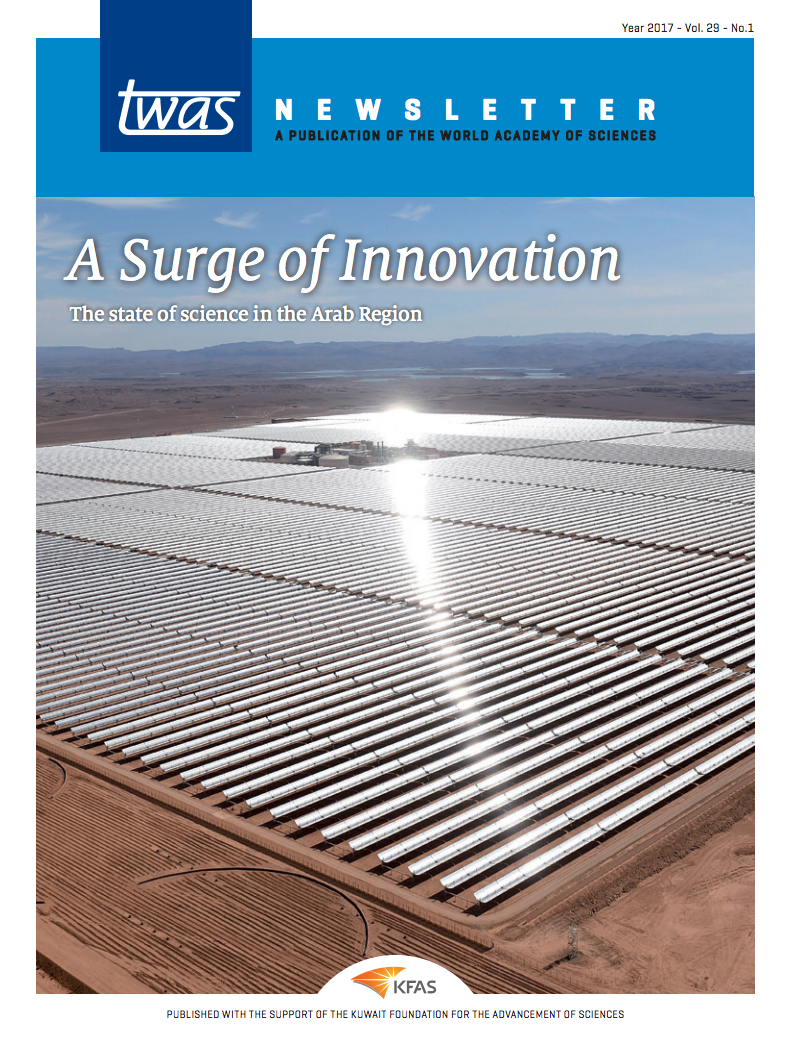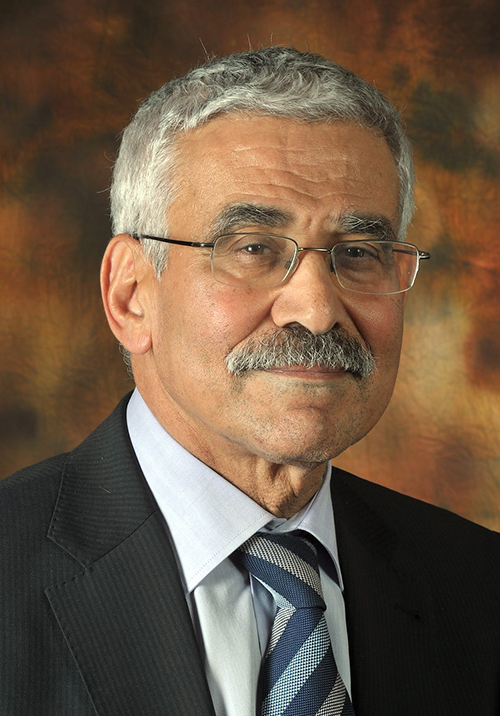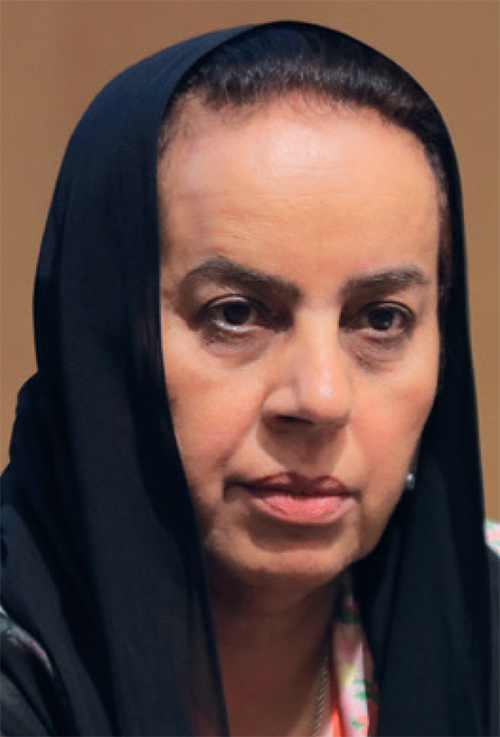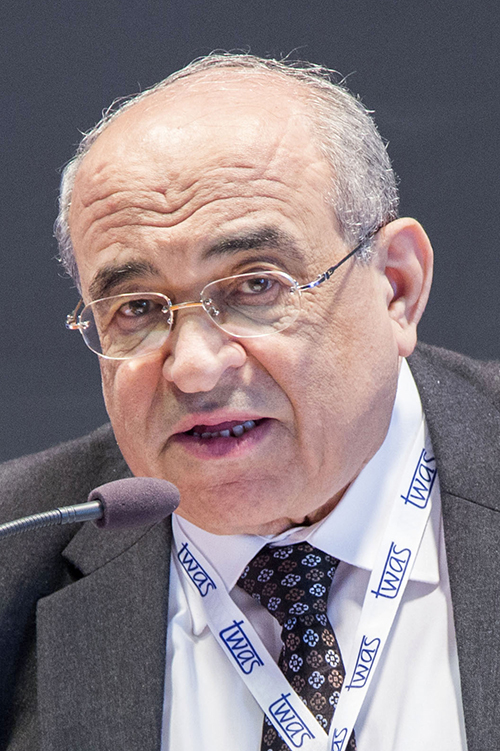The Arab World extends from Oman in the east to Morocco in the west, and across the span of 22 countries there is extraordinary richness and diversity – distinct but often interwoven histories, varied cultures and values, extremes of wealth and poverty. And, as with all countries on Earth, the Arab countries face a range of challenges, many linked to science.
 For perspective on the state of science in the Arab region, TWAS interviewed three important partners: TWAS Fellow Adnan Shihab-Eldin, director general of the Kuwait Foundation for the Advancement of Sciences; Mostafa el Feki, director of the Bibliotheca Alexandrina in Egypt, which hosts the TWAS Arab Regional Office; and Rafia Ghubash, president of the Arab Network for Women, Science and Technology, which is hosted by the Bibliotheca.
For perspective on the state of science in the Arab region, TWAS interviewed three important partners: TWAS Fellow Adnan Shihab-Eldin, director general of the Kuwait Foundation for the Advancement of Sciences; Mostafa el Feki, director of the Bibliotheca Alexandrina in Egypt, which hosts the TWAS Arab Regional Office; and Rafia Ghubash, president of the Arab Network for Women, Science and Technology, which is hosted by the Bibliotheca.
Though each brings a unique view, there are points of convergence: Especially in North America and Europe, they say, few recognise the historical achievements of Arab researchers, or the growing influence of Arab women in modern science and engineering. At the same time, they said, much must be done to strengthen Arab science so that it can support economic development and peaceful prosperity. And science diplomacy could be critically important – if Arab leaders develop its potential.
The interviews were conducted by Edward Lempinen, the TWAS public information officer.
In general terms, how would you describe the state of science and research in the Arab region?
 Shihab-Eldin: Despite the promising growth in higher education and research institutions, the scientific research system within the Arab region continues to be hindered by the lack of a clear and unified vision for the role of science, innovation and technology (STI) in development. This has resulted in limited investments by governments and the private sector within the Arab region, directed towards research and development (R&D), evident by the very low percent contribution of their gross domestic product (GDP) to R&D, which is an integral part of developing a knowledge-based economy for national and regional sustainability. This has also led to policies and outputs with modest public awareness and appreciation of science in addressing a range of challenges facing the region, such as socioeconomic growth, human development, extremism and ignorance.
Shihab-Eldin: Despite the promising growth in higher education and research institutions, the scientific research system within the Arab region continues to be hindered by the lack of a clear and unified vision for the role of science, innovation and technology (STI) in development. This has resulted in limited investments by governments and the private sector within the Arab region, directed towards research and development (R&D), evident by the very low percent contribution of their gross domestic product (GDP) to R&D, which is an integral part of developing a knowledge-based economy for national and regional sustainability. This has also led to policies and outputs with modest public awareness and appreciation of science in addressing a range of challenges facing the region, such as socioeconomic growth, human development, extremism and ignorance.
Ghubash: Generally, it is so difficult to assess the Arab world as one country, because there are huge differences between one region and another, with regards to economy which affects the outcome of education. Therefore, it could be more logical to divide the region according to other indicators which will include the income, size of population and also other factors. To answer your question, we have to have some valid statistics based on good studies. But in my opinion, being president for a regional university before as well as being dean of a medical school, there is some good evidence that some of the Gulf countries achieved global ranking with
el Feki: I must tell you frankly it is very poor. You know, the Arabs are divided into two sections: The rich countries sometimes are not using their money for scientific research, and the poor side, they are often saying that they don’t have enough money to cover the costs of scientific research. But both are not correct. You know, scientific research does not require the cost that poor countries are talking about, and the rich countries, it’s to their advantage to use as much as they can of their wealth to build up the future through scientific research.
More specifically, what challenges currently confront science in the region? And what opportunities do you see?
 Shihab-Eldin: At the forefront of the challenges confronting science in the region is the lack of appreciation for and value in scientific research in the society, starting at the governmental level, as indicated by the limited government resources for R&D, to individuals within the community. Thus, a large portion of scientific research performed in universities and institutes often does not lead to applications that can be utilized for the enhancement of other segments of the society, such as the private sector’s products and services. Developing sustained polices and plans by governments for spending on R&D will ensure greater success in building a knowledge-based economy and long-term sustainability, allowing for the translation of scientific research into applications benefiting all factions of the society. One opportunity that we must capitalize on is the fact that in nearly every country within the region, more than half of the population is under 30, presenting a unique occasion for promoting STI capacity-building through innovative formal and informal channels, ensuring that the future development of the region is linked to increased investment and competency in STI.
Shihab-Eldin: At the forefront of the challenges confronting science in the region is the lack of appreciation for and value in scientific research in the society, starting at the governmental level, as indicated by the limited government resources for R&D, to individuals within the community. Thus, a large portion of scientific research performed in universities and institutes often does not lead to applications that can be utilized for the enhancement of other segments of the society, such as the private sector’s products and services. Developing sustained polices and plans by governments for spending on R&D will ensure greater success in building a knowledge-based economy and long-term sustainability, allowing for the translation of scientific research into applications benefiting all factions of the society. One opportunity that we must capitalize on is the fact that in nearly every country within the region, more than half of the population is under 30, presenting a unique occasion for promoting STI capacity-building through innovative formal and informal channels, ensuring that the future development of the region is linked to increased investment and competency in STI.
Ghubash: The Arab countries should be serious about shifting to investment in knowledge and give it a priority, and share this concern with their nations so that everything should be geared towards investment in knowledge, curriculum of schools, universities and higher education to implement such a concept. As well as companies which should be the leading institutions to encourage learning and development among their employees and to reduce the gap between the importance of and the readiness for learning and development. Research has shown that not even a quarter of companies are comfortable with modern learning environments. Clearly, more needs to be done. But there are opportunities: Most of the Arabic countries are young – 60% of their population is younger than 20 years. And the Gulf region is rich and could spend more on scientific research and education.
el Feki: I want their vision through scientific research to be changed, toward science. It’s not a luxury. It’s not an extra issue. It is an essential element for progress and for building up the future. That’s why we have to concentrate on this point and avoid the previous understanding that science is only done by the West and that it is not something done in our part of the world. Because I must tell you frankly Westernisation is not the only path to modernisation – no. Modernisation could be made through national experiences – like China, Japan, India. I hope the Arabs will follow the same steps.
In Europe and North America, do you think that policymakers and people generally have a good awareness of science in the Arab region?

Shihab-Eldin: There is a little, if any, understanding and appreciation by the West about the rich history of the Arab World in the advancement of scientific disciplines, such as astronomy, mathematics and chemistry, dating back to the 9th and 10th centuries. Arab scientists have continued the tradition of science by contributing to the furthering of many scientific disciplines, but most who have made notable, internationally recognized and acclaimed contributions, such as Nobel Prize winners, established research careers outside of the region, predominantly in Western Europe or North America. In the 21st century, we are seeing the promising results of R&D efforts in a few newly established and government-supported institutions in the Gulf states, and in some instances, governments have adopted research strategies as a part of their national development plans. This is still nascent. Building a solid and active innovation ecosystem involves a series of intricately connected institutions and complex structures, which takes much effort, time, and the cooperation of every part of the economic and social framework in a society. While a great deal has been accomplished in countries within the Arab region, in most societies, we have yet to master the nuances in this complex process, and the integration of all the parts of an effective innovation ecosystem within the whole fabric of our society. This involves more spending by the government and private sector on research and development, which is a must. But just as important is an enabling platform for policy change and human capital development.
Ghubash: Not at all. They are very ignorant about the situation and they only see the negative aspect in this part of the world which is the result of the wars inside and among Arab countries for the last 100 years. A war which is triggered by the West for unjustified reasons. Politics has a large effect on the learning and development of this region. However, very few European institutions have provided support to scientific centres or universities in the Arab region and also recruit Arab scientists, which makes a difference in the outcome. I wish and hope that one day the curriculum in the European countries include the role of Arabs in science in the early history to change the stereotype and for the West to understand and be aware that Arabs have potential to be involved in science and technology if they live in fair and stable environments.
el Feki: I want to tell them, whenever you encourage scientific research in the other countries, it will help to have an impact on poverty. Poverty is like a time-bomb everywhere. And reducing poverty will defuse terrorism. if they want to defuse terrorism, they have to upgrade the standards of living in these countries. One of the main messages to them is to go ahead with scientific research, encourage science, and give more attention to education.
At the end of the day, after maybe one decade or a little more, you’ll see that the phenomenon of terrorism will start to disappear.
Do you see growing interest in science and technology careers among young people in the region?
Shihab-Eldin: There are certainly some encouraging signs, such as the rise in the number of STEM graduates within the region. However, to change the current STI culture, tsunami-like policies are needed to increase the youth’s engagement and appreciation for science, and to motivate the government to significantly increase R&D investment. This will lead to not only STEM graduates, but an increase in qualified professionals in STI fields. Currently in the Gulf countries, a good portion of STEM graduates end up in the public sector, rather than the productive private sector. This trend needs to change, and policymakers can play a central role. KFAS is tackling these challenges by encouraging the public and youth to appreciate science through formal and informal engagements, and by working with the private sector to advance and improve their STI capabilities, presenting rewarding career opportunities for recent graduates.
Ghubash: Studies show that the relative share of S&T students among the overall student population has been falling in the European countries. As for the status in the Arab countries, there are no data to evaluate the situation. Research should be encouraged and supported by organisations like TWAS or the UNESCO to be carried out and evaluate the conditions. Policymakers are trying to encourage interest in science, but unfortunately there is no clear national vision about what should be done.
el Feki: Let us hope – sometimes they are talking about this. And you know, if you just take it by numbers, we have thousands of schools, we have tens of thousands of teachers. But the education process is stale, it’s from the past. They have to think with modern styles and means of education. The educational process should be modernised, should be updated. This is the point. No, you don’t need simply to put in the minds of children more information. No – you have to teach them how to think, analytic approaches, methodology, the way of thinking, priorities. These are all means and ways of modern education, but they’re not there right now.
Are there social or cultural obligations unique to the Arab countries that create limitations or challenges for women scientists?
Shihab-Eldin: Traditionally, there has been an inherent pressure, on women from all over the world, in balancing a professional career with the responsibilities of family and personal life. The Arab World is no exception, but, recently, there are promising trends that showcase the prominent role of Arab women in science and technology. The UNESCO Science Report notes that some 60% of Arab STEM graduates are women, and the Economist reported that over 25% of Arab start-ups are founded or led by women. Yet more needs to be done to support women in STEM majors and careers and to increase their presence in leadership positions. Women need a strong support system, involving everyone from government officials to families and friends. In October 2017, KFAS hosted the “Women Leaders in Science, Technology and Engineering Conference”[link: http:// bit.ly/2FZS5Nz], which focused on empowering women scientists and promoting their rights and advancement. Ultimately, the true potential of any society will continue to rely on the contribution of the intellect, innovation and creativity of both men and women.
Ghubash: Not at all, the real situation is that we in the Arab region have more female students applying for medical, engineering and scientific majors in comparison to male students. Recently in the UAE, five female teachers were the winners for scientific awards for their inventions.
el Feki: No, I tell you this is not as before. We have talented young girls and ladies concentrated on their own scientific careers, and they are not much worried about marriage and social life and family. They are thinking of their future as scientists. That’s why the differences between males and females in that regard have started to disappear. We have many scientific researchers among the ladies and girls. Women are invited like men to participate in scientific research and to work in science. Especially in the educational system, among school teachers and administrators, women are sometimes more or less equal in number to the males, 50 to 50. That’s why their role is not too far equal in science and scientific research. They are invited and we have very broad-minded university professors in very specialised areas of science. This we can’t ignore.
How would you assess the current state of regional scientific cooperation among Arab countries?
Shihab-Eldin: The answer: weak at best. There are many notable contributions of Arab scientists in the advancement of research at the local level. However, most of the quality output is produced through international collaborations. Regional organisations or regional branches of international organisations need to do much more to promote and support regional cooperation in STI in the region. There are examples of success stories towards this end: Tech start-ups are booming in the Middle East, such as the recent acquisition of Souq.com by Amazon, and the success of Careem, the region’s fast-growing ride-sharing company. Diabetes plagues much of the Gulf region, and the Gulf Program for Diabetes Control has been formed in response. The Synchrotron-light for Experimental Science and Applications (SESAME) is an example of what is needed more in the Middle East. These should serve as a stepping stone for the development of more forums for regional and international collaboration.
Ghubash: To my knowledge, there is no cooperation among Arab countries at all. But neither are there statistics to base my answer on.
el Feki: Very limited. There is no cooperation whatsoever. Some students from the Gulf states come to Egypt or to Jordan or to Lebanon to study, but there is no scientific link as such. Or it’s at a level to be observed. Sometimes the Arab League is trying to do it. As an example, there is a common nuclear orgainisation for the Arab countries. But still this is a repeated effort, and there are no fresh ideas to help in that regard. The self-determination, the rulers’ goodwill, to go through scientific research field is very important and essential. Everything in our part of the world comes from political decision – sometimes an aberrant political decision. Unless you are the leaders of the country – and I think the president of Egypt (Abdel Fattah el-Sisi) is trying to do that now, sometimes, to create results. You have to try.
Do you see the countries of the region using science diplomacy to improve engagement in science or science policy?
Shihab-Eldin: In the Arab world, where the consequences of civil and regional conflict are prevalent, science diplomacy can be an extremely powerful tool for building bridges between nations. The development of national science organization to fund, promote and support the inclusion of STI and raise cooperation and collaboration among countries regionally and internationally, was pioneered in Kuwait in the 60s and 70s. Kuwait proposed in 1976 the establishment of an endowment for the advancement of inter-Arab cooperation in R&D and STI. Unfortunately, the political climate has not allowed such proposals to materialize. Through establishment of institutions like KFAS, regional and international collaborations are being made possible. This has led to the establishment of similar organisations in the Gulf region for promoting research for national development, and to enhance dialogue and cooperation, such as the Qatar Foundation, MASDAR in the UAE, and KACST and KAPSARC in Saudi Arabia. We can certainly make a more concerted effort to create channels for science diplomacy, which is not only essential to regional STI development, but more importantly to the promotion of regional peace and stability.
Ghubash: Let me share with you this article which answers the question: “Science Diplomacy in Arab Countries: The Need for a Paradigm Shift” [link: www.bit.do/SciDipShift] (by Nart Dohjoka, Cathleen A. Campbell and Brenna Hill, Science Diplomacy, 17 March 2017): “...science alone cannot solve the many political, security, and economic problems that Arab countries face today. However, science diplomacy has an important role to play in addressing the health, environmental, energy, water, and food challenges that contribute to regional instability. These are shared problems that transcend national borders, and solving them will require collaboration.”
el Feki: Maybe only in the field of technical aid. Among countries of our region, no, there is not much (science diplomacy), but maybe by exchanging visiting professors and the talented scientists. But we don’t have much more. We are looking forward to activate that, and I hope the Bibliotheca Alexandrina will be able to play a role in that field in particular.
What policies or programmes does your organisation offer to support young people and women, and for building international cooperation?
Shihab-Eldin: For the past 40 years, KFAS has embedded and strengthened the presence of STI within the various domains of Kuwait society, promoting STI through three main stakeholders: the society at large, especially the youth; the research community; and the private sector. Programmes and initiatives have been developed to engage these stakeholders, such as the support through funding of research, dissemination of resources for enhancing science education, support for advancing the development of the private sector through STI training and funding, and international partnerships to foster these initiatives. KFAS has also established centres that have focused on the promotion and advocacy of science, technology and innovation, where opportunities are provided for more engagement and collaborations in STI initiatives, especially for the youth. The Scientific Center of Kuwait, one of KFAS’s centres, provides an entertainment and educational platform for children and their families to engage in science and math. Another KFAS centre, the Sabah Al-Ahmed Center for the Giftedness and Creativity, allows young inventors to enhance their innovative and creative minds and foster their inventions into potential commercial applications.
Ghubash: When we established the Arab Network for Women, Science and Technology we did our best to find a way to help the young female graduates from different Arab countries to find opportunities in some of the good centres, but we faced many limitations and we could not progress any further. This could have had a good outcome if I had received support from different organisations that could help. Leaders need to do more to promote their value and credibility to support women in the field of science and technology.
el Feki: Yes, this is the main target we are trying to start. We want the Bibliotheca Alexandrina to be a centre of attraction for new generations. The president – when he visited, he told me for we should concentrate on the young generation, that the Bibliotheca should be a centre of scientific research and arts and literature, for national heritage, for joint thinking for the future, for brainstorming sessions. And we have centres in all of these branches. We are concentrating on arts, and science, and literature, and all sides of culture in general, young people and old, women and men. But we have a special concentration on the young generation.

